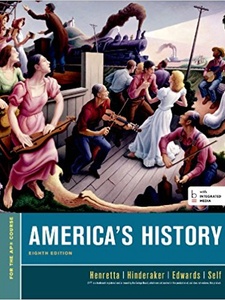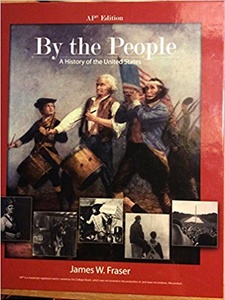How did Reconstruction affect African Americans quizlet? ✅ [Update]
Kinh Nghiệm về How did Reconstruction affect African Americans quizlet? Chi Tiết
Hoàng Trung Dũng đang tìm kiếm từ khóa How did Reconstruction affect African Americans quizlet? được Cập Nhật vào lúc : 2022-11-22 07:16:04 . Với phương châm chia sẻ Kinh Nghiệm Hướng dẫn trong nội dung bài viết một cách Chi Tiết 2022. Nếu sau khi tham khảo nội dung bài viết vẫn ko hiểu thì hoàn toàn có thể lại phản hồi ở cuối bài để Tác giả lý giải và hướng dẫn lại nha.Nội dung chính Show
- How did the Reconstruction Act affect African Americans?How did Reconstruction change life for African Americans quizlet?What were the social changes for African Americans during the Reconstruction?What role did African American play in Reconstruction quizlet?
 U.S. History
U.S. History1st EditionJohn Lund, Paul S. Vickery, P. Scott Corbett, Todd Pfannestiel, Volker Janssen
567 solutions
 America's History for the AP Course
America's History for the AP Course9th EditionEric Hinderaker, James A. Henretta, Rebecca Edwards, Robert O. Self
961 solutions
 America's History for the AP Course
America's History for the AP Course8th EditionEric Hinderaker, James A. Henretta, Rebecca Edwards, Robert O. Self
470 solutions
 By the People: A History of the United States, AP Edition
By the People: A History of the United States, AP EditionJames W. Fraser
496 solutions
in 1857, the United States Supreme Court issues a decision in the Dred Scott case, affirming the right of slave owners to take their slaves into the Western territories, there by negating the doctrine of popular sovereignty and severely undermining the platform of the newly created Republican Party. At the heart of the case was the most important question of the 1850s: Should slavery be allowed in the West? As part of the Compromise of 1850, residents of newly created territories could decide the issue of slavery by vote, a process known as popular sovereignty. When popular sovereignty was applied in Kansas in 1854, however, violence erupted. Americans hoped that the Supreme Court could settle the issue that had eluded a congressional solution. Dred Scott was a slave whose owner, an army doctor, had spent time in Illinois, a không lấy phí state, and Wisconsin, a không lấy phí territory the time of Scott's residence. The Supreme Court was stacked in favor of the slave states. Five of the nine justices were from the South while another, Robert Grier of Pennsylvania, was staunchly pro-slavery. Chief Justice Roger B. Taney wrote the majority decision, which was issued on March 6, 1857. The court held that Scott was not không lấy phí based on his residence in either Illinois or Wisconsin because he was not considered a person under the U.S. Constitution-in the opinion of the justices, black people were not considered citizens when the Constitution was drafted in 1787. According to Taney, Dred Scott was the property of his owner, and property could not be taken from a person without due process of law. In fact, there were không lấy phí black citizens of the United States in 1787, but Taney and the other justices were attempting to halt further debate on the issue of slavery in the territories. The decision inflamed regional tensions, which burned for another four years before exploding into the Civil War.
The Battle of Fort Sumter was the first battle of the American Civil War. The intense Confederate artillery bombardment of Major Robert Anderson's small Union garrison in the unfinished fort in the harbor Charleston, South Carolina, had been preceded by months of siege-like conditions. During the secession crisis that followed President Abraham Lincoln's election in November 1860, many threats were made to Federal troops occupying forts in the South. Anderson, in command the difficult-to-defend Fort Moultrie on Sullivan Island across the harbor from Charleston, began asking the War Department for reinforcements and making plans to move his men to one of the fortifications on more secure islands in the harbor—Castle Pinckney closer to Charleston or the unfinished Fort Sumter near the harbor's entrance.
Following South Carolina's secession on December 20, 1860, Governor Francis Pickens was pressured to do something about Anderson and his men since many believed that Anderson would not stay Fort Moultrie but would take a better position another of the harbor's forts. On December 24, Pickens sent proxies to Washington to negotiate what would be done about the occupied forts and to ensure Anderson remained Fort Moultrie. However, on December 26 Anderson put his plan into action: he assembled his men, loaded them and their families onto boats, and rowed to Fort Sumter. What followed was basically a siege of Fort Sumter, with supplies and communication controlled by Pickens.
The proclamation did not không lấy phí all of the slaves in the US, nor did it truly abolish slavery. In fact, it only applied to states that had already seceded from the Union and had not yet been returned to Union control. That meant that the Border states, as well as the Confederate states that the North had already brought back into their control, were not affected by the proclamation all. The only slaves that were theoretically affected by the Proclamation were those that were in Confederate-controlled states - which were not under Lincoln's jurisdiction the time. In other words, the slaves were not yet không lấy phí until the Union won the war. In fact, the Proclamation was more of a symbolic statement than anything else. It didn't change the existence of slavery, but it did change the meaning of the Civil War. Originally, the war was merely a fight in which the North was trying to preserve the Union by reuniting the North and South. The Proclamation changed the war into a war on slavery. After the Proclamation, each Union victory was a victory for those who opposed slavery. It gave slaves who were fighting for their freedom a reason to hope again, and it gave those who supported the Union moral support to depend on. n the Proclamation, Lincoln declared that freed slaves could fight for the Union. Additional soldiers were desperately needed that point, so the Union was utilizing the previous unelibible men to assist in conserving the country. By the war's end, close to 200,000 black soldiers and sailors had fought on the Union's side.
In summary, why was the Emancipation Proclamation written? It was written to show that the Civil War was no longer just about a divided nation, but about stemming the tide of slavery. The Proclamation was used to increase morale and the number or soldiers to win the war. Although it did not accomplish anything tangible, it gave hope to those who wished and fought to abolish slavery.
Immediately after the Civil War, America needed to rebuild itself both structurally and socially. As the President of the United States, Andrew Johnson led the chiến dịch to obtain the congressional votes needed to ratify the 13th Amendment, which abolished slavery. To be readmitted to the Union, states had to support the amendment.
During the Reconstruction, or the rebuilding of the South, some Southern states still found ways to discriminate against former slaves and limit voting to white men only. For example, Southern states used black codes, which were laws to limit the labor and social rights of former slaves. These limitations on voting were overturned by the 15th Amendment, which President Andrew Johnson unsuccessfully attempted to veto, due to his lenient attitudes towards the former Confederate states and staunch support of state's rights. The term 'veto' refers to the president's constitutional right to reject congressional legislation. The 15th Amendment, which was ratified in 1870, contained two sections. Section One stated that ''The right of citizens...to vote shall not be denied or abridged...on account of race, color, or previous condition of servitude.'' Section Two granted the U.S. Congress the power to enforcement through legislation.
The U.S. Bureau of Refugees, Freedmen and Abandoned Lands, popularly known as the Freedmen's Bureau, was established in 1865 by Congress to help former black slaves and poor whites in the South in the aftermath of the U.S. Civil War (1861-65). Some 4 million slaves gained their freedom as a result of the Union victory in the war, which left many communities in ruins and destroyed the South's plantation-based economy. The Freedmen's Bureau provided food, housing and medical aid, established schools and offered legal assistance. It also attempted to settle former slaves on Confederate lands confiscated or abandoned during the war. However, the bureau was prevented from fully carrying out its programs due to a shortage of funds and personnel, along with the politics of race and Reconstruction. In 1872, Congress, in part under pressure from white Southerners, shut the bureau.
Once in office, Johnson focused on quickly restoring the Southern states to the Union. He granted amnesty to most former Confederates and allowed the rebel states to elect new governments. These governments, which often included ex-Confederate officials, soon enacted black codes, measures designed to control and repress the recently freed slave population. When the U.S. Congress convened in December 1865, it refused to seat the newly elected Southern members, and Johnson found himself odds with the legislature, particularly the Radical Republicans, who viewed the president's approach to Reconstruction as too lenient.
In 1866, Johnson vetoed the Freedmen's Bureau bill and the Civil Rights bill, legislation aimed protecting blacks. That same year, when Congress passed the 14th Amendment granting citizenship to blacks, the president urged Southern states not to ratify it (the amendment nevertheless was ratified in July 1868). During the 1866 congressional elections, Johnson launched a multiple-city speaking chiến dịch, dubbed "a swing around the circle," in which he attempted to win support for his Reconstruction policies. The tour proved to be a failure, and the Republicans won majorities in both houses of Congress and set about enacting their own Reconstruction measures.
Hostilities between the president and Congress continued to mount, and in February 1868, the House of Representatives voted to impeach Johnson. Among the 11 charges, he was accused of violating the Tenure of Office Act by suspending Secretary of War Edwin Stanton (1814-1869), who opposed Johnson's Reconstruction policies. That May, the Senate acquitted Johnson of the charges by one vote.
Reconstruction encompassed three major initiatives: restoration of the Union, transformation of southern society, and enactment of progressive legislation favoring the rights of freed slaves. President Abraham Lincoln's Proclamation of Amnesty and Reconstruction—issued in 1863, two years before the war even ended—mapped out the first of these initiatives, his Ten-Percent Plan. Under the plan, each southern state would be readmitted to the Union after 10 percent of its voting population had pledged future loyalty to the United States, and all Confederates except high-ranking government and military officials would be pardoned. After Lincoln was assassinated in 1865, President Andrew Johnson adopted the Ten-Percent Plan and pardoned thousands of Confederate officials. Radical Republicans in Congress, however, called for harsher measures, demanding a loyalty oath from 50 percent of each state's voting population rather than just 10 percent. Although such points of contention existed, both presidents and Congress agreed on one major point—that the southern states needed to abolish slavery in their new state constitutions before being readmitted to the Union.
The Radical Republicans also believed that southern society would have to be completely transformed to ensure that the South would not try to secede again. The Radicals therefore attempted to reshape the South by enfranchising blacks, putting Unionist and pro-Republican governments in southern legislatures, and punishing southern planter elites, whom many politicians held responsible for the Civil War. As "carpetbaggers" (northerners who moved to the South after the war) and "scalawags" (white Unionists and Republicans in the South) streamed into the South, southerners denounced them as traitors and falsely accused many of corruption. However, through organizations like the congressionally approved Freedmen's Bureau, the U.S. government did manage to distribute confiscated lands to former slaves and poor whites as well as help improve education and sanitation and foster industrial growth in rebuilt southern cities.
Ultimately, the most important part of Reconstruction was the push to secure rights for former slaves. Radical Republicans, aware that newly freed slaves would face insidious racism, passed a series of progressive laws and amendments in Congress that protected blacks' rights under federal and constitutional law. The Thirteenth Amendment abolished slavery, the Civil Rights Act of 1866 and the Fourteenth Amendment granted blacks citizenship, the Fifteenth Amendment gave black men the right to vote, and the Civil Rights Act of 1875 attempted to ban racial discrimination in public places
Black codes set civil rights back a good number of decades, and signified how America was still grossly prejudiced despite the whole Reconstruction facade and the addition of the 13th - 15th amendments. They also illustrate how the Southern states held a distinct pride separate from the rest of the States, even after the Civil War. They didn't want to give up their old lifestyle. Black codes were only one of the ways that they tried to maintain their old way of life. I suppose in a way, black codes actually sparked the need for the civil rights movement, because African Americans were treated as second-class citizens despite the Bill of Rights which clearly stated they were equals. They laid down laws that pertained only to black citizens, so that African Americans were still second class "citizens" despite the 13th, 14th, and 15th amendments and the new values forced on the South during the Reconstruction. They made it possible for businesses to openly discriminate against African Americans, allowed poll taxes and tests to be placed on a person's voting rights - note that anyone who voted before 1864 was grandfathered in, but obviously no African American voted before that time - and made it illegal for a white woman to marry a black man. They also made it so that black citizens had to buy crops from their former masters, drawing them into a cycle of debt which was inherited by their children - this is where the term "sharecropper" came from; the plantation owners loaned them crops of land interest rates they could never possibly pay off.
So basically black codes were a way for Southerners during the Reconstruction era to keep African American citizens under the same bondage they were in as slaves.
the Reconstruction Acts of 1867 were introduced, debated, and eventually passed within Congress but not without controversy. Products of Republican efforts, the purpose of these laws was to reshape the South and secure equal rights for African Americans. They also set ultimatums for former Confederate states before they could officially rejoin the Union. The Reconstruction Acts of 1867 included the following terms:
New State Constitutions - Former Confederate states would have to create new state constitutions. Committees formed to create these constitutions were composed of mainly Republicans, including African Americans. A key component in all constitutions was that voting rights were extended to all adult men, including African Americans. Native American men on tribal lands were excluded.
Military Districts- the South was divided into the following five
military districts:
Virginia
North Carolina and South Carolina
Georgia, Alabama, and Florida
Mississippi and Arkansas
Louisiana and Texas
Each district was under the charge of a military commander who had the power to appoint and remove state officials. These military leaders would also register voters and organize state elections.
Map showing military districts established by the Reconstruction Acts, 1867
Ratification of the 14th Amendment - Former Confederate states would have to ratify the Fourteenth Amendment, which states, 'All persons born or naturalized in the United States... are citizens of the United States.' It also guarantees 'no state shall ... deny to any person within its jurisdiction the equal protection of the laws.'
This amendment would essentially guarantee constitutional protection of the Civil Rights Act of 1866, which ordered citizenship and equal rights to all people born in the United States 'without distinction of race or color, or previous condition of slavery or involuntary servitude.'
The impeachment of President Andrew Johnson was a result of political conflict and the rupture of ideologies in the aftermath of the American Civil War. It rose from uncompromised beliefs and a contest for power in a nation struggling with reunity. Andrew Johnson was intent on carrying out this plan when he assumed the Presidency. This policy, however, did not sit well with certain radical Republicans in Congress who wanted to set up military governments and implement more stringent terms for readmission of the seceded states. As neither side was willing to compromise, a clash of wills ensued. The political backing to begin impeachment came when Johnson breached the Tenure of Office Act by removing Edwin Stanton, Secretary of War, from his cabinet. The Tenure of Office Act had been passed over Johnson's veto in 1867 and stated that a President could not dismiss appointed officials without the consent of Congress.
Both Lincoln and Johnson had experienced problems with Stanton, an ally of the Radicals in Congress. Stanton's removal, therefore, was not only a political decision made to relieve the discord between the President and his cabinet, but a test for the Tenure of Office Act as well. Johnson believed the Tenure of Office Act was unconstitutional and wanted it to be legally tried in the courts. It was the President, himself, however, who was brought to trial.
During Reconstruction, Grant pursued the Ku Klux Klan in South Carolina and effectively disabled the organization until the 1920s, but racism still abounded in the South. With the conviction that business supported the national interest, he signed legislation that protected entrenched business interests. This set the stage for more monopoly, public unrest over the accumulation of wealth, and increased corruption. Grant was unanimously renominated in 1872 and won reelection, but more scandal plagued his close associates, like his Secretary of War, William W. Belknap, and his private secretary, Orville E. Babcock, who were both involved in graft schemes.
He left office in disgrace and struggled to complete his memoirs while dying of cancer, so that his family would have some means of support after his death. Grant finished his two-volume work, one of the finest presidential memoirs ever, four days before he died.
Reconstruction was a success in that it restored the United States as a unified nation: by 1877, all of the former Confederate states had drafted new constitutions, acknowledged the Thirteenth, Fourteenth, and Fifteenth Amendments, and pledged their loyalty to the U.S. government. Reconstruction also finally settled the states' rights vs. federalism debate that had been an issue since the 1790s.
However, Reconstruction failed by most other measures: Radical Republican legislation ultimately failed to protect former slaves from white persecution and failed to engender fundamental changes to the social fabric of the South. When President Rutherford B. Hayes removed federal troops from the South in 1877, former Confederate officials and slave owners almost immediately returned to power. With the support of a conservative Supreme Court, these newly empowered white southern politicians passed black codes, voter qualifications, and other anti-progressive legislation to reverse the rights that blacks had gained during Radical Reconstruction. The U.S. Supreme Court bolstered this anti-progressive movement with decisions in the Slaughterhouse Cases, the Civil Rights Cases, and United States v. Cruikshank that effectively repealed the Fourteenth and Fifteenth Amendments and the Civil Rights Act of 1875.
Meanwhile, the sharecropping system—essentially a legal form of slavery that kept blacks tied to land owned by rich white farmers—became widespread in the South. With little economic power, blacks ended up having to fight for civil rights on their own, as northern whites lost interest in Reconstruction by the mid-1870s. By 1877, northerners were tired of Reconstruction, scandals, radicals, and the fight for blacks' rights. Reconstruction thus came to a close with many of its goals left unaccomplished.
How did the Reconstruction Act affect African Americans?
During the decade known as Radical Reconstruction (1867-77), Congress granted Black American men the status and rights of citizenship, including the right to vote, as guaranteed by the 14th Amendment and 15th Amendment to the U.S. Constitution.How did Reconstruction change life for African Americans quizlet?
Passed in 1868, during the Reconstruction period. The amendment granted citizenship and legal rights to African Americans. It established that anyone who was born or naturalized in the United States was a citizen and that the states could not deny the rights of any citizens.What were the social changes for African Americans during the Reconstruction?
Reconstruction brought important social changes to former slaves. Families that had been separated before and during the Civil War were reunited, and slave marriages were formalized through legally recognized ceremonies.What role did African American play in Reconstruction quizlet?
African Americans played an important role in Reconstruction politics both as voters and as elected officials. In states where African American voters were the majority, they contributed heavily to Republican victories.
Post a Comment